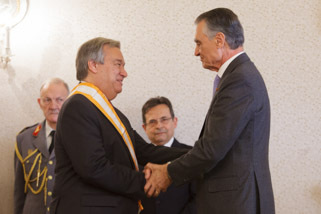
Honourable President of the Lisbon Academy of Science,
Honourable President of the Organizing Committee of the 2008 Vieira Year
Honourable Academicians,
Honourable Professors,
Ladies and Gentlemen,
I am greatly pleased to be here today, in the Academy of Science, presiding at the opening ceremony of the commemorations of the fourth centenary of the birth of Father António Vieira.
It is always gratifying to evoke the memory of someone who has left such deep impressions in history, due to social, scientific or even other pursuits.
But when that someone commands our respect in so many interests as Father António Vieira, gratification is changed into justifiable joy, if not even in pride, for all who retrace that singular figure of Portuguese history.
It is difficult, in the case of Father António Vieira, to decide what best to admire: the virtuosity of the preacher or the acumen of the diplomat in the service of national independence, the grandeur and majesty of his prose, which led Fernando Pessoa to rate him «emperor of the Portuguese language», or the tenacity with which he defended the rights of the Amerindian people, or the King’s councillor to whom is owed the reconciliation with the Jewish settlement in the Netherlands, or yet the visionary who dreamt of a fifth empire for Portugal.
Father António Vieira was all of that, and in all of it he left a trace of genius. It is sufficient to read some of the many pages written in his hand to confirm not just the intelligence and the fine sensitivity of the writer, but also the will, the strength and the determination of the politician and of the missionary.
Many believe, and rightly so, that his sermons, together with the epic poem “Lusíadas”, are the most extraordinary monuments ever risen to the Portuguese language.
But the letters he sent from Rome, from Paris and from Amsterdam also show us a subtle observer of European politics in his time. And those which he sent from Maranhão are some of the more impressive documents concerning the colonization of Brazil.
All of Father António Vieira’s work is demonstrative of genius and demonstrative of faith.
Faith in God, of course, as can be guessed from the activities he relates of himself as a missionary.
But faith, as well, in the destinies of a country and in the possibilities of a State whose independence he saw restored, in 1640, and later helped to consolidate.
At a time when many doubted that Portugal could still reassert its sovereignty, Father António Vieira changed from being a brilliant preacher into an unflagging diplomat, serving the interests of the Country in the courts of Europe with the same endeavour as he previously gave, and again later, to the evangelization of the Americas.
Faith, additionally, in human condition: corruption and other evils against which he often showed revolt from the pulpit did not make him lose faith, neither did the then dominant prejudices stop him from dialoguing with all with whom he crossed paths.
In spite of the differences in civilization, Father António Vieira believed in the man who existed in each of the Indians of Brazil, whom he uncompromisingly defended against the greed of some of the colonists.
In spite of the differences in religion, Father Vieira knew how to see and denounce the injustice which was the expulsion of the Jews, to such a point and with such vigour that he was suspected to be one himself.
The hazards which Portugal crossed during the Restoration, and the suspicions that landed on him, that even led to his imprisonment, were not sufficient to make him bend or lower his arms. Father Vieira always believed.
Believed and took action. More than a man of words he was a man of action. Not even when the misfortunes of politics deprived him from the trust of the court and from the relevant role he had accomplished there, did Father António Vieira give up: he went back to be the missionary he had never truly stopped being, leaving his little free time to his literary works, that extraordinary legacy he would leave us.
Illustrious academicians,
Ladies and Gentlemen,
When commemorating the fourth centenary of the birth of Father António Vieira in the beginning of the 21st century, what impresses us most of all, is the topicality with which this great figure of our history continues to appear before us.
As was the case 400 years ago, the diversity of peoples and civilizations requires today, possibly yet more, politicians and mediators such as Father Vieira, who truly believe in the value of the human person and are sufficiently inspired to lay the bridges that lead to peace.
We can and must believe in our potential as a nation with a history of eight centuries, a history which can, for exactly that reason, also become a History of he Future.
This is the lesson we can learn from Father António Vieira’s life and work. This was the message he left us and to which we are obliged to be faithful, under threat of deluding all who, such as him, dreamt, with or without an empire, of a dynamic, civilized and prosperous Country.
© 2006-2016 Presidency of the Portuguese Republic
You have gained access to the records of the Official Site of the Presidency of the Republic from 9 March 2006 to 9 March 2016.
The contents available here were entered in the site during the 10 year period covering the two mandates of President of the Republic Aníbal Cavaco Silva.